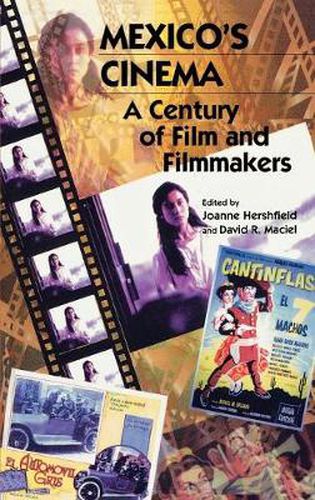Readings Newsletter
Become a Readings Member to make your shopping experience even easier.
Sign in or sign up for free!
You’re not far away from qualifying for FREE standard shipping within Australia
You’ve qualified for FREE standard shipping within Australia
The cart is loading…






In recent years, Mexican films have received high acclaim and impressive box-office returns, earning prestigious international awards in film festivals worldwide. Moreover, Mexico has the most advanced movie industry in the Spanish-speaking world in terms of economic resources, technical production, number of films produced annually, and in distribution. Its impact on Mexican culture and society cannot be overstated. Mexico’s Cinema: A Century of Film and Filmmakers is a collection of 14 essays that encompass the first 100 years of the cinema in Mexico. Included are original contributions written specifically for this title, plus a few classic pieces in the field of Mexican cinema studies. These essays explore a variety of themes including race and ethnicity, gender issues, personalities and the historical development of a national cinematic style. Each of the book’s three sections - The Silent Cinema, The Golden Age, and The Contemporary Era - is preceded by a short introduction to the period and a presentation of the major themes addressed in the section. This anthology includes pieces by Mexican and North American scholars, including a piece by the internationally acclaimed essayist Carlos Monsivais. Contributors include other acclaimed scholars and critics as well as young scholars who are currently making their mark in the field of film studies of Mexico. These authors represent various fields - community studies, film studies, cultural history, ethnic studies, and gender studies - making this volume an interdisciplinary resource. Mexican cinema has made a major impact throughout Latin America and the Spanish-speaking population of the United States. This is therefore a useful resource for courses in Latin America and Third World cinema, Mexican history and culture, and Chicana/o and ethnic studies.
$9.00 standard shipping within Australia
FREE standard shipping within Australia for orders over $100.00
Express & International shipping calculated at checkout
In recent years, Mexican films have received high acclaim and impressive box-office returns, earning prestigious international awards in film festivals worldwide. Moreover, Mexico has the most advanced movie industry in the Spanish-speaking world in terms of economic resources, technical production, number of films produced annually, and in distribution. Its impact on Mexican culture and society cannot be overstated. Mexico’s Cinema: A Century of Film and Filmmakers is a collection of 14 essays that encompass the first 100 years of the cinema in Mexico. Included are original contributions written specifically for this title, plus a few classic pieces in the field of Mexican cinema studies. These essays explore a variety of themes including race and ethnicity, gender issues, personalities and the historical development of a national cinematic style. Each of the book’s three sections - The Silent Cinema, The Golden Age, and The Contemporary Era - is preceded by a short introduction to the period and a presentation of the major themes addressed in the section. This anthology includes pieces by Mexican and North American scholars, including a piece by the internationally acclaimed essayist Carlos Monsivais. Contributors include other acclaimed scholars and critics as well as young scholars who are currently making their mark in the field of film studies of Mexico. These authors represent various fields - community studies, film studies, cultural history, ethnic studies, and gender studies - making this volume an interdisciplinary resource. Mexican cinema has made a major impact throughout Latin America and the Spanish-speaking population of the United States. This is therefore a useful resource for courses in Latin America and Third World cinema, Mexican history and culture, and Chicana/o and ethnic studies.